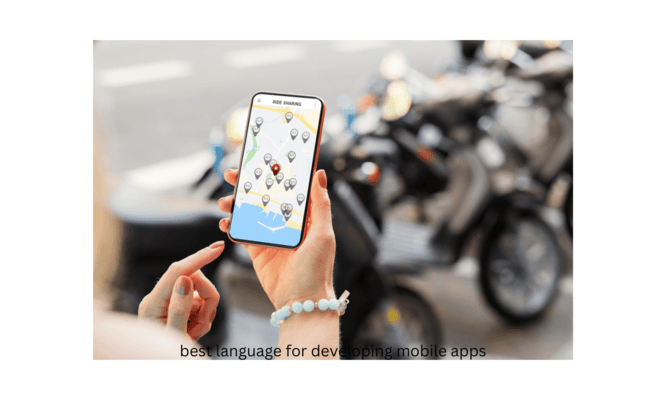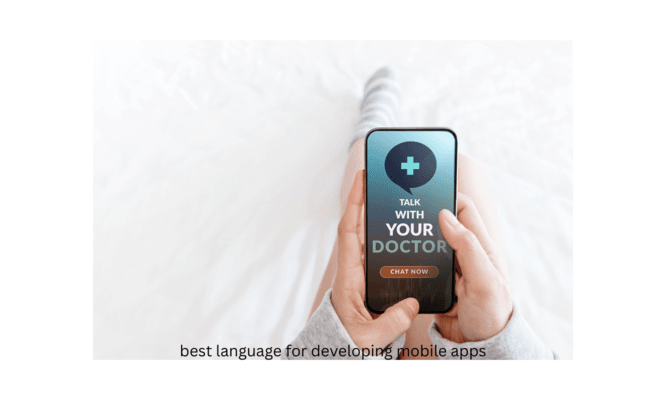Versatile applications have become a fundamental portion of our everyday lives, the best language for developing mobile apps, serving different purposes from excitement to efficiency. As the request for versatile apps proceeds to rise, engineers confront the vital choice of selecting the finest programming dialect for their ventures. The choice of dialect can altogether affect the execution, versatility, and in general victory of the app. In this article, we’ll dig into the realm of versatile app improvement and investigate the finest languages suited for making extraordinary portable encounters.
Understanding the Significance of Choosing the Proper Dialect
The choice of the programming dialect lays the establishment for the whole app advancement handle. Each dialect comes with its interesting highlights, points of interest, and confinements. Hence, understanding the significance of choosing the proper dialect is vital to the victory of your versatile app wander.
Variables to Consider When Choosing a Dialect for Versatile App Improvement
Stage Compatibility
One of the essential contemplations when selecting a dialect is stage compatibility. Distinctive stages like iOS, Android, and cross-platform arrangements have shifting dialect inclinations. Guaranteeing compatibility with the target stage is significant for coming to a broader group of onlookers. Best Language for Developing Mobile Apps.
Execution
Execution plays a significant part in conveying consistent client involvement. The language’s effectiveness in taking care of resource-intensive assignments, memory administration, and by and large responsiveness straightforwardly impacts the app’s execution.
Community Back
Community bolster cultivates development, gives valuable resources, and encourages problem-solving inside the engineering community. Picking for dialects with dynamic and dynamic communities guarantees to get to opportune overhauls, libraries, and systems. Best Language for Developing Mobile Apps.
Learning Bend
The learning bend related to a dialect influences the advancement timeline and asset assignment. Choosing a dialect with a shorter learning bend engages developers to rapidly adjust and execute unused highlights, eventually speeding up the app advancement preparation.
Best Programming Dialects for Versatile App Advancement
Java
Java remains a well-known choice for Android app advancement due to its strength, adaptability, and broad libraries. Its stage freedom and flexibility make it a perfect dialect for making feature-rich Android applications.
Kotlin
Kotlin, embraced by Google as the favored dialect for Android advancement, offers present-day language structure, invalid security, and consistent interoperability with existing Java code. Its brief sentence structure and diminished boilerplate code improve designer efficiency and code practicality. Best Language for Developing Mobile Apps.
Swift
Swift revolutionized iOS app advancement with its speed, security, and expressiveness. Created by Apple, Swift gloats progressed highlights like optional, sort induction, and memory administration, empowering engineers to construct high-performance, outwardly shocking iOS apps.
JavaScript (Respond Local)
React Native, fueled by JavaScript, empowers engineers to construct cross-platform portable apps with a single codebase. Its component-based design, hot reloading, and broad community bolster streamlining the improvement handle, permitting quick emphasis and arrangement.
Dart (Flutter)
Vacillate, sponsored by Google, utilizes the Dash programming dialect to form excellent, natively compiled applications for versatile, web, and desktop from a single codebase. Best Language for Developing Mobile Apps. Its receptive system, customizable widgets, and quick improvement cycle make it a compelling choice for building immersive client encounters.
C# (Xamarin)
Xamarin enables designers to use their existing C# abilities to construct local Android, iOS, and Windows apps. Its shared codebase, local execution, and consistent integration with Visual Studio empower fast improvement and arrangement over numerous stages.

Comparison of Dialects
Java vs. Kotlin
Both Java and Kotlin are broadly utilized for Android app advancement, each advertising its one-of-a-kind set of highlights and preferences. Whereas Java gloats a tremendous biological system and demonstrated unwavering quality, Kotlin stands out with its present-day sentence structure, invalid security, and improved engineer efficiency. Best Language for Developing Mobile Apps.
Swift vs. Objective-C
Swift speaks to a critical jump forward in iOS app advancement, advertising progressed execution, security, and readability compared to its forerunner, Objective-C. Swift’s brief sentence structure and progress highlight rearrangement assignments and advance code viability. Best Language for Developing Mobile Apps.
Flutter vs. Respond Local
Flutter and Respond Local rule the cross-platform versatile advancement scene, offering developers the adaptability to construct high-quality apps for numerous stages with a single codebase. Whereas Flutter excels in execution and customizability, Respond Local brags a bigger community and broad library support.
Choosing the Proper Dialect for Your Venture Best Language for Developing Mobile Apps
Selecting the proper dialect for your versatile app venture requires cautious thought of different variables such as stage prerequisites, extended scope, designer ability, and long-term objectives. By weighing the masters and cons of each language and evaluating its appropriateness for your particular extended needs, you’ll be able to make an educated choice that sets the arrangement for victory.
Future Patterns in Portable App Advancement
The scene of portable app advancement proceeds to advance quickly, driven by mechanical progressions, changing client desires, and rising showcase patterns. As we see towards the long, run patterns like increased reality (AR), Web of Things (IoT), counterfeit intelligence (AI), and blockchain are balanced to reshape the portable app ecosystem, opening up unused openings for advancement and differentiation. Best Language for Developing Mobile Apps.
Conclusion
Choosing the most excellent dialect for developing mobile apps could be a critical choice that can significantly affect the victory of your extend. By considering components such as stage compatibility, performance, community back, and learning curve, engineers can make educated choices that align with their extended necessities and long-term goals. Whether it’s Java for Android, Quick for iOS, or cross-platform arrangements like Vacillate and Respond Local, the key is to select a dialect that engages you to form remarkable versatile experiences that delight clients and drive trade victory.
FAQs
Which programming dialect is best for fledglings in portable app advancement?
For tenderfoots, dialects like Kotlin for Android and Quick for iOS offer advanced language structure, broad documentation, and dynamic communities, making them the perfect choices to kickstart your portable app improvement travel.
Is cross-platform advancement appropriate for all sorts of versatile apps?
Whereas cross-platform improvement offers benefits like code reuse and quicker advancement cycles, it may not be suitable for apps requiring broad platform-specific highlights or requesting execution prerequisites.
How imperative is community back when choosing a programming dialect?
Community support plays a vital part in giving assets, investigating help, and fostering collaboration within the engineering community. Picking for languages with vibrant communities guarantees access to profitable bits of knowledge and convenient upgrades.
What are the key contemplations when comparing programming dialects for portable app advancement?
When comparing programming languages, components such as platform compatibility, execution, learning bend, community back, and long-term reasonability ought to be carefully evaluated to make an educated decision aligned together with your extended objectives.
What role do developing technologies like AR, IoT, and AI play within the future of versatile app improvement?
Developing innovations like increased reality, the Web of Things, and fake insights display exciting opportunities for development and separation in versatile app improvement, empowering designers to make immersive encounters that cater to advancing client needs and inclinations.

